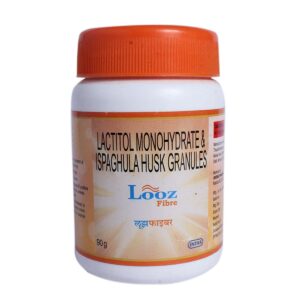ISPHAGULA HUSK + LACTITOL
Isphagula Husk: Isphagula Husk, also known as Psyllium Husk, is a natural dietary supplement derived from the seeds of the Plantago ovata plant. It is commonly used as a bulk-forming laxative to treat constipation and promote regular bowel movements.
The mechanism of action of Isphagula Husk is due to its high fiber content. When consumed, it absorbs water and swells in the intestine, forming a gel-like substance. This increases the bulk of stool, making it easier to pass through the digestive system. The increased bulk also stimulates the muscles of the intestines, promoting regular bowel movements.
Isphagula Husk is available in various forms such as powder, capsules, and chewable tablets. It should be taken with a full glass of water or other fluids. The exact dosage may vary depending on the individual’s age, condition, and response to treatment. It is important to follow the recommended dosage instructions provided by the healthcare professional or as mentioned on the product label.
Common side effects of Isphagula Husk may include bloating, flatulence (excessive gas), and mild abdominal discomfort. These side effects are usually mild and temporary. It is important to drink plenty of fluids while taking Isphagula Husk to prevent the risk of dehydration or intestinal blockages.
In some rare cases, individuals may experience more severe side effects such as allergic reactions, difficulty swallowing, or worsening of constipation. If any of these side effects occur, it is essential to seek immediate medical attention.
Isphagula Husk should not be used for a prolonged period or in higher doses than recommended unless directed by a healthcare professional. It is not recommended for use in individuals with certain medical conditions, such as intestinal obstruction, swallowing difficulties, or inflammatory bowel diseases.
Overall, Isphagula Husk is an effective and safe over-the-counter laxative that can help relieve constipation. However, it is always advisable to consult a healthcare professional or pharmacist before starting any new medications or supplements to ensure its suitability and proper usage.
Lactitol: Lactitol is a synthetic sugar alcohol that is commonly used as a laxative in the management of constipation. It is a white powder that is water-soluble.
The mechanism of action of lactitol is osmotic. It works by drawing water into the colon, softening the stool and promoting bowel movements. Lactitol is not digested or absorbed by the body, so it passes through the gastrointestinal tract intact.
The usual dose of lactitol for adults is 10-20 grams (2-4 teaspoons) once daily. It is best taken with a glass of water or juice. The dose for children varies depending on their age and weight, and it is best to consult a healthcare provider for appropriate dosage recommendations.
Common side effects of lactitol include bloating, flatulence, and abdominal discomfort. These side effects are usually mild and resolve on their own. In rare cases, excessive doses or prolonged use of lactitol may cause diarrhea or electrolyte imbalances. It is also important to note that lactitol should be used with caution in patients with hereditary fructose intolerance.
As with any medication, it is recommended to consult a healthcare professional for proper usage and to discuss any potential side effects or drug interactions before starting lactitol therapy.

